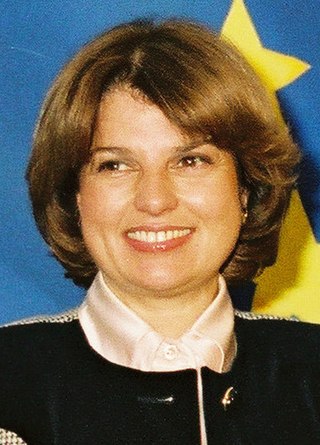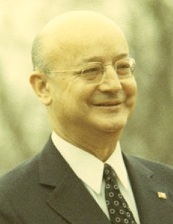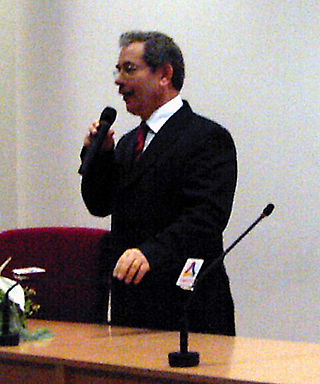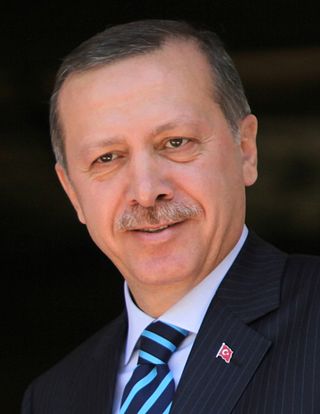See also
| History |
| ||||
|---|---|---|---|---|---|
| Society and its environment |
| ||||
| Economy |
| ||||
| Government and politics | |||||
| National security in Turkey |
| ||||
| Culture | |||||
| Ministries |
|
|---|---|
| Offices | |
| Defunct | |
This is a chronological list of deputy prime ministers of governments of the Republic of Turkey. Deputy Prime Minister was an office under the prime ministry between 1946 and 2018. Not all cabinets had the post of deputy prime minister. The political party of the deputy prime minister is affixed to his name when it differed from the prime minister's party as it was the case in coalition governments. Deputy Prime Minister of Turkey abolished together with the Prime Ministry's in 2018.
| Key: | CHP | DP | AP | ANAP | DYP | RP | DSP | AK Party | Other |
|---|
| Key: | CHP | DP | AP | ANAP | DYP | RP | DSP | AK Party | Other |
|---|

The Czech Republic is a unitary parliamentary republic, in which the president is the head of state and the prime minister is the head of government. Executive power is exercised by the Government of the Czech Republic, which reports to the Chamber of Deputies. The legislature is exercised by the Parliament. The Czech Parliament is bicameral: the upper house of the Parliament is the Senate, and the lower house is the Chamber of Deputies. The Senate consists of 81 members who are elected for six years. The Chamber of Deputies consists of 200 members who are elected for four years. The judiciary system is topped by the trio of the Constitutional Court, Supreme Court and Supreme Administrative Court.

The prime minister of New Zealand is the head of government of New Zealand. The incumbent prime minister, Christopher Luxon, leader of the New Zealand National Party, took office on 27 November 2023.
A minister of state is subordinate to a minister, who heads a ministry. The minister covers the entire ministry and the minister of state assists and performs other functions as assigned by the minister.
A deputy prime minister or vice prime minister is, in some countries, a government minister who can take the position of acting prime minister when the prime minister is temporarily absent. The position is often likened to that of a vice president, as both positions are "number two" offices, but there are some differences.
The Cabinet of Australia, also known as the Federal Cabinet, is the chief decision-making body of the Australian government. The cabinet is appointed by the prime minister of Australia and is composed of senior government ministers who head the executive departments and ministries of the federal government. The cabinet is separate to the federal Department of the Prime Ministers and Cabinet.

The prime minister of Turkey, officially the prime minister of the Republic of Turkey, was the head of government of the Republic of Turkey from 1920 to 2018, who led a political coalition in the Turkish Parliament and presided over the cabinet. Throughout the political history of Turkey, functions and powers of the post have changed occasionally. Prior to its dissolution as a result of the 2017 Constitutional Referendum, the holder of the premiership was generally the dominant figure in Turkish politics, outweighing the president.
A minister is a politician who heads a ministry, making and implementing decisions on policies in conjunction with the other ministers. In some jurisdictions the head of government is also a minister and is designated the ‘prime minister’, ‘premier’, ‘chief minister’, ‘chancellor’ or other title.

Tansu Çiller is a Turkish academic, economist, and politician who served as the 22nd Prime Minister of Turkey from 1993 to 1996. She was Turkey's first and only female prime minister. As the leader of the True Path Party, she went on to concurrently serve as Deputy Prime Minister of Turkey and as Minister of Foreign Affairs between 1996 and 1997.

İsmail Nihat Erim was a Turkish politician and jurist. He served as the 13th Prime Minister of Turkey for almost 14 months after the 1971 Turkish military memorandum. He was assassinated by the Revolutionary People's Liberation Party/Front in Istanbul in 1980.

Erdal İnönü was a Turkish theoretical physicist and politician who served as the interim prime minister of Turkey between 16 May and 25 June 1993. He also served as the deputy prime minister of Turkey from 1991 to 1993 and as the minister of foreign affairs from March to October 1995. He served as the leader of the Social Democracy Party (SODEP) from 1983 to 1985 and later the Social Democratic Populist Party (SHP) from 1986 to 1993. He was the son of the second president of Turkey, İsmet İnönü.

Serdar Denktaş is son of Rauf Denktaş, the former President of the de facto Turkish Republic of Northern Cyprus.

The deputy prime minister of India, although not a Constitutional post, is the second-highest ranking minister of the Union in the executive branch of the Government of India and is a senior member of the Union Council of Ministers. The office holder also deputises for the prime minister in their absence.

Ferit Sadi Melen was a Turkish civil servant, politician and Prime Minister of Turkey.

The government of Russia is the federal executive body of state power of the Russian Federation. The members of the government are the prime minister, the deputy prime ministers, and the federal ministers. It has its legal basis in the Constitution of the Russian Federation and the federal constitutional law "On the Government of the Russian Federation". The Apparatus of the Government of Russia is a governmental body which administrates the activities of the government.

Abdüllatif Şener is a Turkish politician. He was Minister of Finance of Turkey from 1996 to 1997 and Deputy Prime Minister from 2002 to 2007, under Prime Minister Recep Tayyip Erdoğan.

İbrahim Refik Saydam was a Turkish physician, politician and the fourth Prime Minister of Turkey, serving from 25 January 1939 until his death on 8 July 1942.

Numan Kurtulmuş is a Turkish politician and academic who is currently the speaker of the Grand National Assembly.
The ministries of Turkey are the most influential part of the executive branch of the Turkish government. Each ministry is headed by a minister appointed by the President. Currently there are 17 ministries.

The third cabinet of Recep Tayyip Erdogan was the government of Turkey from 2011 to 2014, during the 24th parliamentary term of the Grand National Assembly of Turkey. The cabinet succeeded the second Erdoğan cabinet following the 2011 Election.
Ahmet Erdem is a Turkish civil servant who served as the Minister of Labour and Social Security in the interim election government formed by Prime Minister Ahmet Davutoğlu between 28 August and 17 November 2015. He was formerly the General Secretary of the Labour and Social Security Ministry Supreme Arbitration Board, Deputy Undersecretary, advisor to the Minister and advisor to the Prime Minister. He serves as the Undersecretary to the Labour and Social Security Ministry since 28 April 2014.